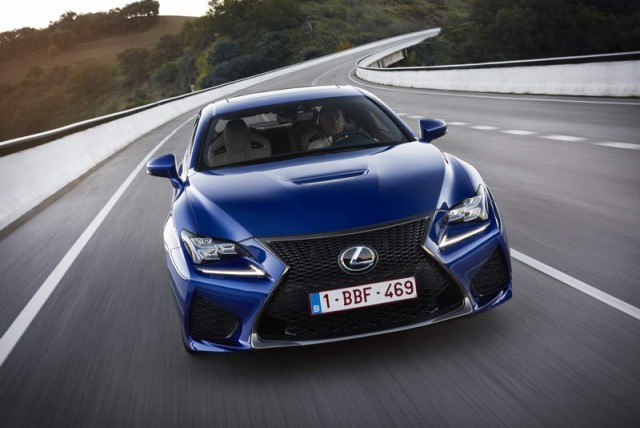Overall rating: 4/5
Lexus goes gunning for the Germans with its latest addition to the F-badged performance stable, the RC F coupé. Using a redeveloped, more powerful version of the 5.0-litre V8 engine from the defunct IS F, the RC is a hugely endearing car, if not quite as competent dynamically as a BMW M4.

In the metal 3.5/5
Perhaps a harsh rating, as there's a lot to like about the RC F. It's an imposing machine, with more than a hint of LFA about it (no bad thing), with the rear styling particularly successful and the profile OK too. It's round the front where there are problems for us. It's just a bit too complex to our eyes, with the split front light clusters and that huge spindle grille coming across as awkward if the car's in the wrong colour; dark blue serves it well, however. It certainly isn't conservative like some German cars we could mention, so it will perhaps win fans by dint of being something different.

The interior is largely excellent, especially the front bucket seats, which are both comfortable and supportive. There's not much room in the rear, though its coupé rivals are all 2+2s as well, and we wish Lexus would just bite the bullet and adopt a rotary controller for its infotainment, a la iDrive. The pad in the RC F works better than some of the Japanese company's other control efforts but it's still clunky to use. Aside from one or two dated plastics (and they're few and far between), the Lexus' cabin looks good and exudes quality.

Driving it 4/5
Ah, this is tricky. Some people are going to dislike the Lexus RC F, especially if they're accustomed to a massive wad of forced induction torque made across many thousands of rpm. That the RC F summons up a pretty decent 530Nm is offset by the fact that peak doesn't arrive until 4,800rpm, with this lofty torque curve exacerbated by ridiculously long gearing in the eight-speed auto (160km/h in fourth with 2,000rpm to go to the redline and another four cogs to come is just madness) and the RC F's major drawback - its weight. At 1,765kg, it is porky; and as we all know, weight is the biggest killer of on-the-limit driving fun.

However, with time on the undulating Ascari race circuit offered up by the manufacturer, the RC F's case doesn't fall apart. It's actually a decent track machine, given that it could also quite easily play the role of long-distance GT. True, even in its firmest suspension settings there's more roll across the axles than the most discerning drivers would find ideal, yet you can work around that thanks to limited understeer, a benign, throttle-adjustable rear end, epic brakes and excellent steering; there's a good level of feedback and it's sharp and precise too. On track, it proves capable and entertaining.

It is even more convincing on the road, where its soft-around-the-edges damping allows it to ride with aplomb. However, the crowning jewel in the Lexus' make-up is that magnificent engine. Until 3,500rpm, it's muted, playing to the brand's perceived qualities of serenity and a quiet cabin, but from that point on it emits a terrific, guttural V8 bellow that (yes, here comes the old chestnut) is healthily reminiscent of NASCAR. It easily blows away any of its opposition sonically, given the 6.2-litre V8 in the C 63 is on its way out, to be replaced by forced induction. And it is brutally quick when you stoke it up. Yes, it needs work and revs, but there are ample rewards there for the taking if you're committed. It is every bit as quick as its on-paper performance stats suggest.
What you get for your money 4/5
We were expecting the RC F to be more expensive than the BMW M4 Coupé (i.e. well over €100,000), though signs now are that the Lexus will start at about €105,000, plus its maker says it is better equipped than the German car for the cash. While Lexus Ireland has yet to confirm that it will take the same trim level as other markets, we're expecting few optional extras on the RC F, with the satnav, leather, climate control, cruise control, 10-speaker Pioneer sound system (a 17-speaker Mark Levinson item is an upgrade), LED lights and TFT displays among a health specification. One area where the Lexus will fall down against the turbocharged Germans, though, is running costs, as - despite that languid gearing trying to trim CO2 emissions and fuel consumption as much as possible - the RC F's figures of 252g/km and 10.8 litres/100km are pretty poor by today's standards.

Worth Noting
While final specifications for Ireland have yet to be finalised, the torque-vectoring differential (TVD) is optional on the RC F; otherwise, it comes with a limited-slip diff. The TVD comes as standard on the RC F Carbon, which uses said lightweight material on the bonnet, roof and active rear spoiler, as well as chucking in all the optional toys for a higher purchase price, but there's no confirmation we'll get the Carbon over here.
Summary
By no means flawless, the Lexus RC F is a brilliant third entry to the Lexus F canon after the IS F and sensational LFA. It has one of those tricky-to-define attributes, charisma, which will mean it will find great favour with some and yet will alienate others. Quantifiably, the BMW M4 is the more competent machine dynamically, but the Lexus' barrel-chested V8 and its high levels of refinement mean it offers something different in a market typically dominated by the Germans. For that reason, it's easy to recommend as an excellent and appealing alternative to a BMW, Audi or Mercedes.














































